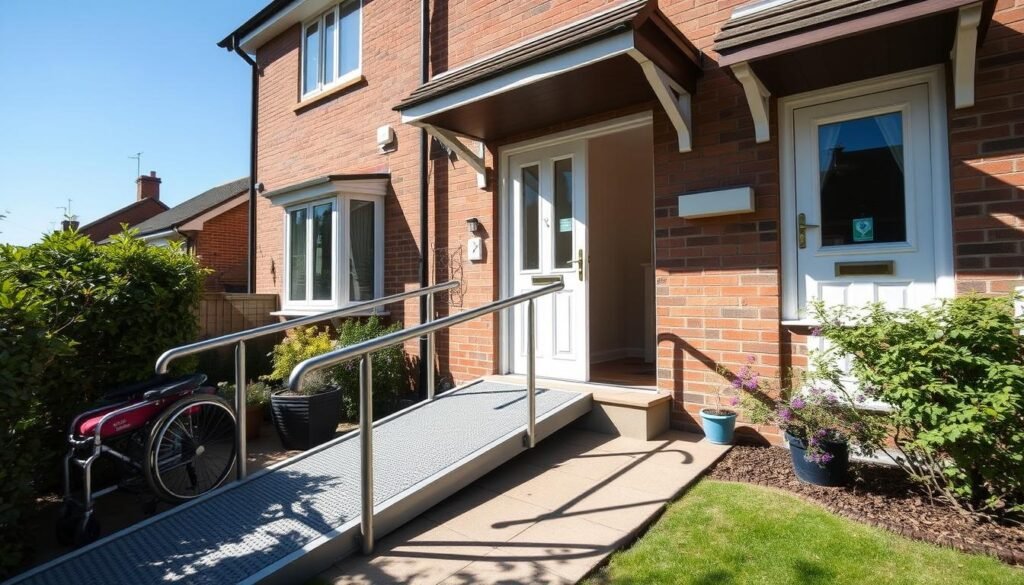How to Sell a Property with a TenantKey Takeaways
- Selling a property with a tenant requires careful planning and communication
- Understanding legal obligations and tenants’ rights is crucial
- Proper valuation and marketing strategies can help attract potential buyers
- Collaboration with estate agents and solicitors can streamline the process
- Offering incentives to tenants can facilitate a smoother sale
As a UK landlord, you might find yourself in a situation where you need to sell a property with a tenant in place. This process can be complex, but with the right approach, it’s entirely manageable. In this comprehensive guide, we’ll explore the ins and outs of selling a tenanted property, providing you with practical advice and strategies to ensure a smooth transaction.
1. Understanding Your Legal Obligations
When it comes to selling a property with a tenant, it’s crucial to understand your legal obligations as a landlord. The rights of your tenants are protected by law, and it’s essential to respect these throughout the selling process.
Tenancy Agreements and Notice Periods
First and foremost, you need to review the existing tenancy agreement. If you have a fixed-term tenancy in place, you generally can’t ask the tenant to leave before the end of the term unless there’s a break clause. For periodic tenancies, you’ll need to provide appropriate notice as per the Housing Act 1988.
Right to Quiet Enjoyment
Remember that your tenants have a right to ‘quiet enjoyment’ of the property. This means you can’t constantly disturb them with viewings or inspections. It’s important to strike a balance between selling your property and respecting your tenants’ rights.
Tenant’s Right to Stay
In most cases, the tenant has the right to stay in the property even after it’s sold, as the tenancy agreement transfers to the new owner. Make sure potential buyers are aware of this situation.

2. Communicating with Your Tenant
Open and honest communication with your tenant is key to a successful sale. Here’s how to approach this delicate situation:
Inform Your Tenant Early
As soon as you decide to sell, inform your tenant. This gives them time to process the information and prepare for potential changes. Be clear about your intentions and what it means for them.
Be Transparent About the Process
Explain the selling process to your tenant, including how viewings will be conducted and what to expect. Reassure them that their rights will be respected throughout.
Address Concerns and Questions
Be prepared to answer questions and address any concerns your tenant might have. This could include worries about rent increases, being asked to leave, or disruptions during viewings.
3. Valuing Your Property
Getting an accurate valuation of your property is crucial when selling a property with a tenant. Here’s what you need to consider:
Professional Valuation
Engage a professional estate agent or surveyor to value your property. They’ll take into account the fact that the property is tenanted, which can affect its market value.
Consider the Tenancy Terms
The terms of the existing tenancy can impact the property’s value. A property with a long-term, reliable tenant might be attractive to investors, while a short-term tenancy might appeal to buyers looking to move in themselves.
Factor in Rental Income
If you’re targeting buy-to-let investors, highlight the current rental income and any potential for increase. This can be a significant selling point.

4. Marketing Your Tenanted Property
Marketing a property with a tenant requires a tailored approach. Here are some strategies to consider:
Target the Right Buyers
Focus on marketing to buy-to-let investors who might be interested in a property with a tenant already in place. Highlight the benefits, such as immediate rental income.
Highlight Tenant Quality
If you have a reliable, long-term tenant, make this a key selling point. Many investors value the security of a good tenant already in place.
Be Honest About Challenges
Be upfront about any challenges, such as restrictions on viewings or the need to honor an existing tenancy. Transparency will help attract serious buyers who understand the situation.
5. Conducting Viewings
Arranging viewings for a tenanted property requires careful planning and consideration. Here’s how to manage this process:
Agree on a Viewing Schedule
Work with your tenant to agree on suitable times for viewings. This might involve setting specific days or time slots to minimize disruption.
Provide Adequate Notice
Always provide your tenant with adequate notice before a viewing, as per your tenancy agreement and legal requirements. This is typically 24 hours’ notice in writing.
Consider Virtual Tours
To reduce disruption to your tenant, consider offering virtual tours or video walkthroughs as an initial viewing option. This can help filter out less serious buyers.
6. Negotiating the Sale
When you receive offers on your property, there are several factors to consider:
Evaluate Buyer Types
Consider whether the buyer is an investor looking to continue renting out the property or someone who wants to live in it themselves. This can affect the sale process and your tenant’s situation.
Discuss Tenancy Terms
Be prepared to discuss the current tenancy terms with potential buyers. Some might prefer to keep the existing tenant, while others might want vacant possession.
Consider Tenant Purchase
Don’t forget that your current tenant might be interested in purchasing the property. This could lead to a smoother transaction, so it’s worth discussing this option with them.
7. Legal Considerations and Documentation
Ensuring all legal aspects are properly handled is crucial when selling a property with a tenant. Here’s what you need to consider:
Transfer of Deposit
If you’re selling to another landlord, you’ll need to arrange for the transfer of the tenant’s deposit to the new owner. This process should be handled carefully to ensure compliance with deposit protection regulations.
Tenancy Agreement Transfer
The existing tenancy agreement will usually transfer to the new owner. Ensure all parties understand their rights and obligations under this agreement.
Energy Performance Certificate (EPC)
You’re required by law to provide an up-to-date Energy Performance Certificate when selling a property. Arrange for an assessment if your current EPC is more than 10 years old.
8. Completing the Sale
As you near the completion of the sale, there are a few final steps to consider:
Notify Your Tenant
Once the sale is confirmed, formally notify your tenant in writing. Provide them with the new owner’s details and any changes to rent payment arrangements.
Arrange for Final Inspections
Coordinate with your tenant for any final property inspections required before completion. Ensure this is done with minimum disruption to the tenant.
Transfer of Keys and Documentation
Arrange for the transfer of all keys, including any spares, to the new owner. Also, ensure all relevant documentation, including the tenancy agreement and deposit information, is handed over.
Key Takeaways
- Communication is key: Keep your tenant informed throughout the process
- Understand legal obligations: Respect your tenant’s rights and follow legal requirements
- Target the right buyers: Focus on investors who value tenanted properties
- Be flexible with viewings: Work with your tenant to minimize disruption
- Handle documentation carefully: Ensure all legal aspects are properly managed
- Consider incentives: Offering incentives to your tenant can facilitate a smoother sale
Frequently Asked Questions
1. Can I evict my tenant to sell the property?
No, you cannot evict a tenant simply because you want to sell the property. Tenants have legal rights, and you must follow proper procedures if you wish to end the tenancy. This typically involves waiting until the fixed term ends or using appropriate grounds for eviction as per the Housing Act 1988.
2. How do I handle viewings with a tenant in place?
You should agree on a viewing schedule with your tenant, providing adequate notice (usually 24 hours) before each viewing. Consider offering incentives to your tenant for their cooperation, such as a rent reduction during the viewing period.
3. Will having a tenant affect the property’s value?
Having a tenant can affect the property’s value, but not always negatively. For buy-to-let investors, a property with a reliable tenant already in place can be attractive. However, for buyers looking to live in the property themselves, a tenanted property might be less appealing.
4. What happens to the tenancy agreement when I sell?
The tenancy agreement typically transfers to the new owner, who becomes the new landlord. The terms of the existing agreement remain in force unless both the tenant and new landlord agree to changes.
5. Should I wait until the tenancy ends before selling?
This depends on your circumstances and the property market. Selling with a tenant in place can be advantageous if you’re targeting buy-to-let investors. However, if you believe you can achieve a higher price with vacant possession, you might choose to wait until the tenancy ends.
6. Can my tenant refuse access for viewings?
Yes, tenants have the right to refuse access for viewings. However, most tenancy agreements include a clause requiring tenants to allow reasonable access for viewings when the property is for sale. It’s best to maintain good communication and work cooperatively with your tenant.
7. Do I need to inform my mortgage lender about the sale?
Yes, you should inform your mortgage lender about your intention to sell. They may have specific requirements or procedures you need to follow.
8. What if my tenant wants to buy the property?
If your tenant expresses interest in buying the property, this could lead to a smoother transaction. Consider this option seriously, as it could benefit both parties.
9. How do I transfer the tenant’s deposit to the new owner?
The process for transferring the deposit depends on which deposit protection scheme you’re using. Contact your scheme provider for specific guidance on transferring the deposit to the new owner.
10. What documents do I need to provide to the buyer?
You’ll need to provide various documents, including the tenancy agreement, deposit protection certificate, gas safety certificate, electrical installation condition report, and energy performance certificate. Your solicitor can advise on the full list of required documents.




